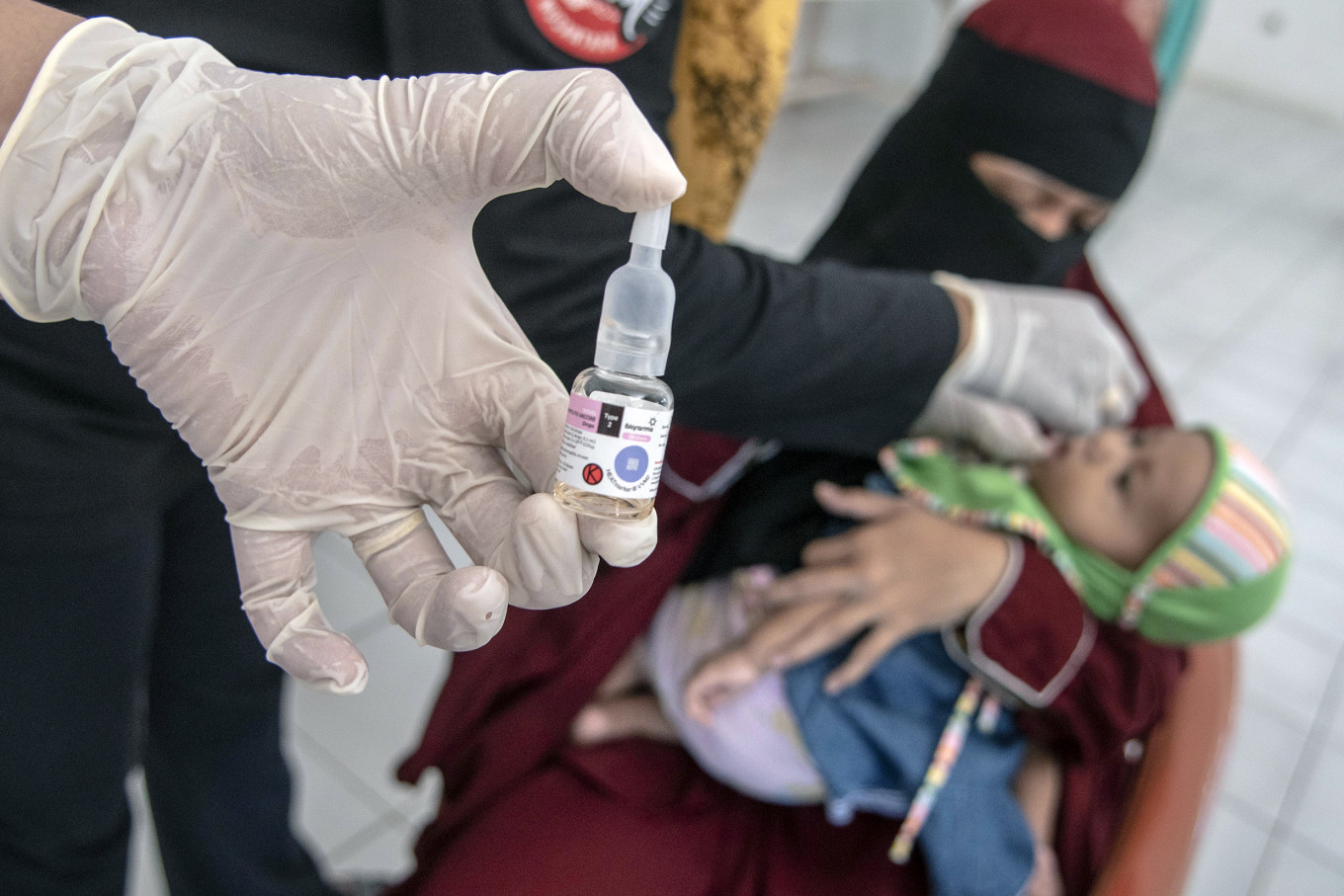Government seeks to boost childhood immunization
Change text size
Gift Premium Articles
to Anyone

T
he government continues to ramp up its efforts to increase the childhood immunization rates, particularly in remote regions, amid outbreaks of various vaccine-preventable diseases across the archipelago.
As per April, only 4.02 percent of the country's 4.3 million children under a year old had received complete basic immunization, far below the Health Ministry target of 33 percent in the first quarter of 2023 and 100 percent by the end of the year.
The coverage was especially low in five provinces, namely Maluku, North Sumatra, Papua, Yogyakarta and Aceh, with those regions only able to vaccinate fewer than 1 percent of their under 1-year-old infants.
"This is very concerning, because low vaccination rates among children and babies means we are unable to reach herd immunity [from vaccine-preventable diseases], increasing risk of outbreaks," ministry spokesperson Mohammad Syahril said.
According to the World Health Organization (WHO), at least 95 percent of all children in a certain population must be fully inoculated to reach herd immunity and prevent outbreaks of vaccine-preventable diseases.
Pandemic backslide
The COVID-19 pandemic led to a significant decrease in childhood immunization across the globe, including Indonesia, as it disrupted essential healthcare services.
A recent report by UNICEF also revealed that vaccine misinformation and hoaxes during the pandemic affected vaccine acceptance among parents and caregivers, with the organization stating that Indonesia was among 55 countries where vaccine confidence declined during the pandemic.
The report showed that globally 67 million children were not immunized over the last three years, the largest sustained backslide in childhood immunization in 30 years.
In Indonesia, the number of children not receiving basic immunization rose from 10 per cent in 2019 to 26 per cent in 2021.
The government has carried out various efforts to close this gap, including by launching a two-phase catch-up vaccination campaign last year.
Through the program, dubbed the National Child Vaccination Month (BIAN), health authorities managed to vaccinate around 26.4 million children in the country with the DPT-HB-Hib shots for diphtheria, whooping cough, tetanus, hepatitis B, pneumonia and meningitis, as well as polio, measles and rubella vaccines.
The campaign also helped the Health Ministry to pass its own target of fully immunizing 90 percent of all targeted infants under 2 years old last year.
Vaccine disparity
Disparity persists despite the achievement, with remote regions such as Aceh and Papua only managing to vaccinate 48 and 57 percent, respectively, of all infants in their regions last year.
According to the Health Ministry, 17 out of the country's 38 provinces failed to reach the target of fully immunizing 90 percent of children under 2 years old last year.
The gap in vaccination has led to various outbreaks of vaccine-preventable diseases, the ministry spokesman Syahril said. As per May 7, at least 74 cities and regencies in 21 provinces had reported diphtheria outbreaks affecting hundreds of children.
Syahril also revealed that this year dozens of measles outbreaks had been recorded in at least 15 cities in four provinces, and 76 cities in 21 provinces saw an outbreak of pertussis or whooping cough, which can be fatal for babies.
He also highlighted the fact that a backslide in the country's basic immunization had led to the country’s first polio cases in four years to occur in November.
The ministry said that health authorities had cooperated with other ministries to increase vaccine coverage in remote regions.
"We worked together with the Home Ministry so that the regional administration can allocate some of its budget to carry out immunization programs," another ministry spokesperson Siti Nadia Tarmizi told The Jakarta Post on Friday.
The Health Ministry also cooperates with the Villages, Disadvantaged Regions and Transmigration Ministry to organize door-to-door vaccinations and works together with the Education, Culture, Research and Technology Ministry to conduct vaccination campaigns in schools.
“We also cooperate with NGOs and the private sector to jab children at integrated health services posts [Posyandu]," she said.
To better protect children against vaccine-preventable diseases, the Health Ministry has recently added three types of children’s routine immunization to the previous 11 types of vaccines.
The ministry also aims to streamline the vaccine management system by integrating all childhood vaccination data through an app called My Healthy Indonesia (ASIK).
The record of each child's vaccination history can then be accessed through the country’s one health platform, SatuSehat. The app will also send notifications to parents to remind them of their children’s immunization schedule.









